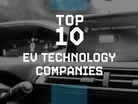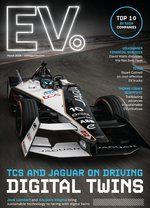
Electric vehicle technology is developing year-on-year, uniting vehicles with their owners and the rest of their technology and keeping EV drivers safe and entertained on the road for longer.
These leading electric vehicle technology companies are revolutionising mobility with a range of technology, from transformative charging networks to zero-emission public transportation. Tesla, ChargePoint, NIO, Apple, Fisker, Faraday Future, Intel, Blink Charging, Proterra & ABB are lighting up the road of electric vehicle technology for a sustainable future.
10. ABB
Multinational technology company ABB is a leader in electrification and automation and is working towards building a resource-efficient future.
ABB provides various products, such as charging units — single and multi — for homes, workplaces and retail, supporting EV drivers on the go or at home.
Its services include a product life cycle management scheme designed to improve operational reliability, maximise operational uptime and lower life cycle costs.
In addition, ABB offers EV charging solutions from AC wallboxes to charging stations with powerful connectivity.
9. Proterra
Proterra recognises that as societies evolve, industrial needs must change to sustain safe, reliable and clean energy options.
The company has a focus on public electric transportation solutions and specialises in electric buses and charging systems. The company is manufacturing zero-emission electric transit vehicles, with durability in mind. Proterra’s electrification experts help manufacturers to electrify their heavy-duty commercial vehicles and offers a turn-key solution and a complete energy ecosystem for medium- and heavy-duty electric fleets.
Blink Charging is a pioneer in EV charging equipment and has sold or deployed 85,000 charging ports across the world. The company is based in Miami Beach, Florida, and was founded in 2009.
Blink Charging’s main line of products includes its Blink EV charging equipment, as well as products and services from recent acquisitions, including SemaConnect, Blue Corner, BlueLA and Envoy. The Blink Network utilises cloud-based software to operate and track relevant EV charging stations connected to the network and the associated charging data.
7. Intel
Intel provides various technology solutions for electric and autonomous vehicles and is providing hardware and software solutions for the automotive sector.
“Intel is taking a ‘whole vehicle’ approach to solving the industry’s biggest challenges. Driving innovative AI solutions across the vehicle platform will help the industry navigate the transformation to EVs,” says Jack Weast, Vice President and General Manager of Intel Automotive.
The recent acquisition of Silicon Mobility aligns with Intel’s sustainability goals and also addresses the critical energy management need.
Founded in 2014, EV startup Faraday Future (FF) is focused on empowering people everywhere to ‘live, move, connect and breathe freely’. FF works on electric SUVs and is a leader in developing EV technologies. One example is the simple but powerful FF Portable Charger, which has dual voltage capability. It can be plugged into a standard household outlet for Level 1, up to 1.4kW, or a NEMA 14-50 outlet for Level 2 charging, up to 9.6kW.
5. Fisker
Electric vehicle automaker Fisker is focused on electric SUVs. Chairman and CEO Henrik Fisker said that the company has been built to make the world's most sustainable vehicles. At the Automobile Awards 2023, the Fisker Ocean won both Best Full Electric Vehicle and SUV of the Year.
“These awards show that we can deliver value to our customers, compete against gasoline and hybrid vehicles — and other EVs — and be recognised as the preferred choice for our sustainability, innovation and good design,” Fisker says.
4. Oracle
Through its Opower solutions, Oracle is enhancing visibility of the EV owner landscape with its presence discovery capability, which identifies customers with electric cars.
Opower solutions position electric vehicles as energy assets, making them critical grid resources for shifting energy load and managing power transmissions. The Opower product product portfolio enables companies to gain cost-efficiency, demand flexibility, engage with customers, and reach limited income households.
3. NIO
Chinese auto manufacturer NIO is based in Shanghai and was founded in 2014. NIO is known for manufacturing electric SUVs and developing battery swapping technology. Recently, CEO William Li live-streamed a 14-hour road trip without stopping to recharge.
“The completion of this endurance challenge proves the product power of the 150kWh ultra-long endurance battery pack,” Li posted on Weibo. “This battery is currently the battery pack with the highest energy density in mass production in the world and has excellent safety performance.”
2. ChargePoint
Electrical equipment manufacturer ChargePoint was founded in 2007 and is based in Campbell, California. The company has become a leading EV charging network provider and the ChargePoint team is focused on creating the best EV charging experience for everyone in the electric transition, whether residential or commercial.
ChargePoint has built a fully-integrated portfolio of hardware and cloud services with the best technology in the industry.
74% of Fortune 50 companies are ChargePoint customers and the company has won a range of awards for its technology.
The United Nations Framework Convention on Climate Change recognised ChargePoint with a Momentum for Change award at COP21. In a partnership programme with BMW and Volkswagen, ChargePoint was one of 16 Lighthouse Activities selected for building Express Charging Corridors, along the coasts of the United States. ChargePoint was also the first EV charging provider to be ENERGY STAR certified for its incredible energy efficiency.
1. Tesla
Tesla is perhaps the best-known EV manufacturer and is focused on producing high-performance electric cars. Tesla’s mission is to accelerate the world’s transition to sustainable energy, from its solar roof technology and energy storage solutions. Tesla’s EV technology is freeing society from reliance on fossil fuels and helping to achieve a zero-emission future.
Its EVs feature groundbreaking technologies such as Autopilot, which allows a car to steer, accelerate and brake automatically within its lane, in addition to eight cameras and 12 sensors which offer a 360-view of the vehicle's surroundings. A HEPA filtration system stops toxic chemicals from entering the cabin, while the touchscreen includes features like video games and live traffic updates.
In 2025, production of Tesla’s newest next-generation EV will begin at its Texas factory. However, CEO Elon Musk has admitted that production will take “a tremendous amount of new revolutionary manufacturing technology”. Tesla is up for the challenge.
******
Make sure you check out the latest edition of EV Magazine and also sign up to our global conference series - Sustainability LIVE 2024
******
EV Magazine is a BizClik brand




